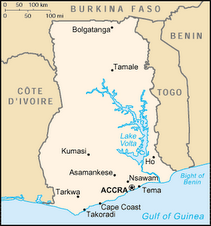Week of 18.04.08
A seriously sick otolaryngology patient arrives every week. The patients present late in their disease after attending a diviner and the failure of local treatment; some patients are brought in dead and 40% of those who die in the hospital expire within their first 24 hours of admission.
This week an eleven year girl arrived with a peritonsillar abscess, Ludwig’s angina and a marginal airway of four days duration. She needed drainage of the abscess, but the mother was reluctant, because the Dagoma people believe death will occur if an injection is given when the patient has a swelling. This is the correct observation of the sequence of events when the patient presents moribund, an intravenous line is started and the patient subsequently expires. Mr. Kadre, our excellent senior ear, nose and throat nurse, explained that the procedure would be a withdrawal and not an injection. The mother agreed and 10 mls of thick, green exudate were aspirated from the peritonsillar abscess. Because of her obstructed airway and the possibility of total obstruction and septic shock, the child was admitted. The otolaryngology nurses spontaneously volunteered to periodically check that the child’s antibiotic, clindamycin, would be given correctly and at the right times. In spite of this, the child still received one dose instead two as ordered, but the next day she was better. I just received a call, now two days later, Sunday, that there is no clindamycin available and the child is sixty percent improved.
Earlier in the week I complained to the matron that a patient received the wrong medication and when the correct medication was given, it was given twice in twenty four hours when it was ordered every six hours. The following day the patient did not receive any antibiotic and I stormed out of her office. Although this incidence was not the matron’s fault, she has been the administrator for years and the system functions poorly with no quality control. On Friday I was appointed "coordinator of clinical affairs" without an explanation of the duties it entails, and was seated with the administrators during a conference. I felt uncomfortable sitting with the administrators as this hospital is run poorly by Ghanaian standards. But, for improvement to occur, it is important to be active in the hospital’s management. With a better system, many lives could be saved. Anyone who wishes to help is encouraged to do so, as a team can do so much more than an individual.
The medical school invited me to evaluate their second year students as they examined the heart, elicited lower extremity reflexes, drew blood on a mannequin and applied bandages. Luckily for the students, their anatomy professor, also an orthopedic surgeon, was examining with me. After the students nervously floundered in front of six observers, he did an excellent job teaching the reflexes and a fair job teaching the cardiac exam. While there I met Dr. Geydare, the new dean, with whom I worked in 1978-79 when we were young like these students and we enjoyed reminiscing after thirty years. Dr. Geydare mentioned that Daniel Buror, a student who lived with us for two years in New Jersey, was working in Sunyani. Our family had grieved when we heard some time ago that Daniel had died in Nigeria, so it was happy news to hear that he is alive and we look forward to seeing him again.
Tuesday, April 29, 2008
Subscribe to:
Post Comments (Atom)


No comments:
Post a Comment